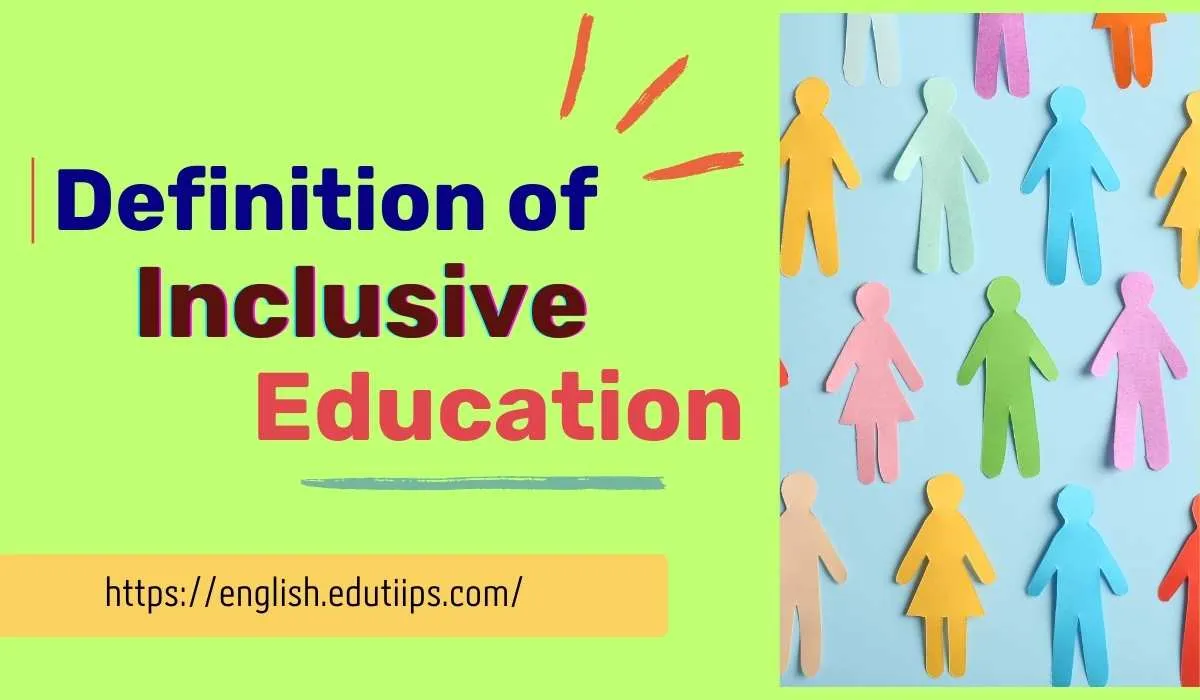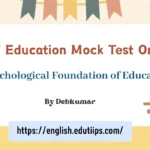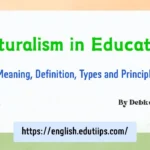Inclusive education is teaching disabled and normal children in a classroom. Different authors give Definition of Inclusive Education in various ways.
This is not a specific educational program, it is an idea. In reality, all children have special needs, and individualized programs need to be tailored to their needs. Children are taught in a friendly environment without any fear of punishment.
Concept of Inclusive Education
In simple words, it means the education of all children with or without disabilities.
Inclusive education is a new approach to educating children with disability. Its learning difficulties with that of normal ones under the same roof It advocates that special children with special needs have to be educated along with normal peers in regular classrooms.
Inclusive education is a set of principles, values and practices that seek to provide meaningful and effective education for all children regardless of whether or not they have exceptionalities.
Nowadays India has advocated the implementation of inclusive education supported by relevant policies, legal enactments, schemes, programs and plans.
In 1974, the centrally sponsored scheme for Integrated Education for Disabled Children (IEDC) was introduced to provide equal opportunities to children with disabilities in general schools and facilitate their retention.
Definition of Inclusive Education by Authors
The following Definition of Inclusive Education by Authors or some renowned educationists makes Inclusive Education more clear.
According to Stephan and Blackhurst –
“Inclusive Education is a set of values, principles and practices that seeks more effective and meaningful education for all students, regardless of whether they have exceptionality labels or not.”
Advani and Chadha (2003) state –
“Inclusive education aims to provide a favorable setting for achieving equal opportunity and full participation for all thus bringing children with special needs well within the preview of mainstreaming education. In simple words, it means that all children with or without disabilities learn together.”
According to Stainback and Stainback (1992) –
“Inclusive school or set-up may be defined as a place where everyone belongs, is accepted, supports and is supported by his or her peers and other members of the school community in the course of having his or her educational needs met.”
According to Florian and Black-Hawkins (2011)
“Inclusive education means that all children and young people—regardless of their background, identity or ability—are welcomed into a learning environment where they are valued equally and supported to learn.”
According to UNESCO (United Nations Educational, Scientific and Cultural Organization) –
“Inclusive education is a process that helps education systems reach out to and support all learners, regardless of their needs, abilities, or learning styles.”
With the release of the Salamanca Statement in 1994 (UNESCO), a large number of developing countries started reformulating their policies to promote the inclusion of students with disabilities into mainstream schools.
According to Booth and Ainscow (2002) – “Inclusion is about the presence, participation and achievement of all students in school.”
Objectives of Inclusive Education
A common learning environment is not a place where students with intellectual disabilities or other special needs learn in isolation from their peers.
The researchers show that teachers in inclusive settings collaborate more and spend more time in planning, learning new techniques from one another, participating in more professional development activities and using a wider range of creative strategies to meet student’s needs.
The following objectives of Inclusive Education have become an important aspect in modern times –
i) Create an environment conducive to equal opportunity,
ii) Equal Access to Quality Education
iii) Reducing Discrimination and Exclusion.
iv) Developing Holistic Learning Environments.
v) Empowering Teachers and Schools.
vi) Supporting Students with Special Needs.
vii) Building Inclusive Societies
viii) Improving Educational Outcomes.
ix) Fulfilling Legal and Human Rights
x) Develop future citizens who are empathetic, inclusive, and capable of contributing to a diverse, democratic society.
xi) Encouraging Active Participation.
xii) Ensure that all students, regardless of ability, disability, gender, ethnicity, or socio-economic status, have access to the same high-quality education within mainstream settings.
So full participation of children in education and thereby bringing all children with special needs into the mainstream of education.
Conclusion
Hence, Inclusive education is about ensuring access to quality education for all students by effectively meeting their diverse needs in a way that is responsive, accepting, respectful and supportive.
So it is a globally accepted approach that ensures all learners, regardless of their background, ability, or disability, receive quality education in the same classroom. It promotes equal opportunity, participation, and success for every student.
Inclusive education is not just a theory—it is a human right. It empowers students, respects diversity, and helps build a more just and educated world. Whether you’re a teacher, policymaker, or student, understanding and promoting inclusive education is essential for long-term educational reform.
References
- Kar. Chintamani, Exceptional Children Their Psychology and Education. Sterling Publication Pvt. Ltd. New Delhi.
- Kirk, S. A. Educating Exceptional Children. Oxford IBH. New Delhi.
- Mangal, S. K. Educating Exceptional Children: An Introduction to Special Education. PHI Learning Pvt. Ltd. New Delhi.
- Panda, K. C. Education of Exceptional Children. Vikas Publishing House Pvt. Ltd. New Delhi.
- Smith, J. A., & Brown, L. M. (2020). Inclusive education: Principles and practices (3rd ed.). Educational Press.
- Kumar, S., & Patel, N. (2021). Understanding diverse learners: Inclusive education approaches. Global Education Publishers.
- Thompson, G. (2017). Teaching students with special needs: Inclusive practices (4th ed.). Learning Tree Press.
- Internet sources
Q – UNESCO definition of inclusive education
Ans – According to UNESCO “inclusive education is a process that helps education systems reach out to and support all learners, regardless of their needs, abilities, or learning styles.”
Q – WHO definition of inclusive education
Ans. – According to WHO – “Inclusive education is a process of addressing and responding to the diversity of needs of all learners through increasing participation in learning, cultures and communities, and reducing exclusion within and from education.”
More Post
- SLST Education Mock Test MCQ | Sociological Foundations of Education
- SLST Education Mock Test Online | Psychological Foundation of Education
- Philosophy of Naturalism in Education: Meaning, Definition, Types and Principles






good post. thanks
thanks for details.